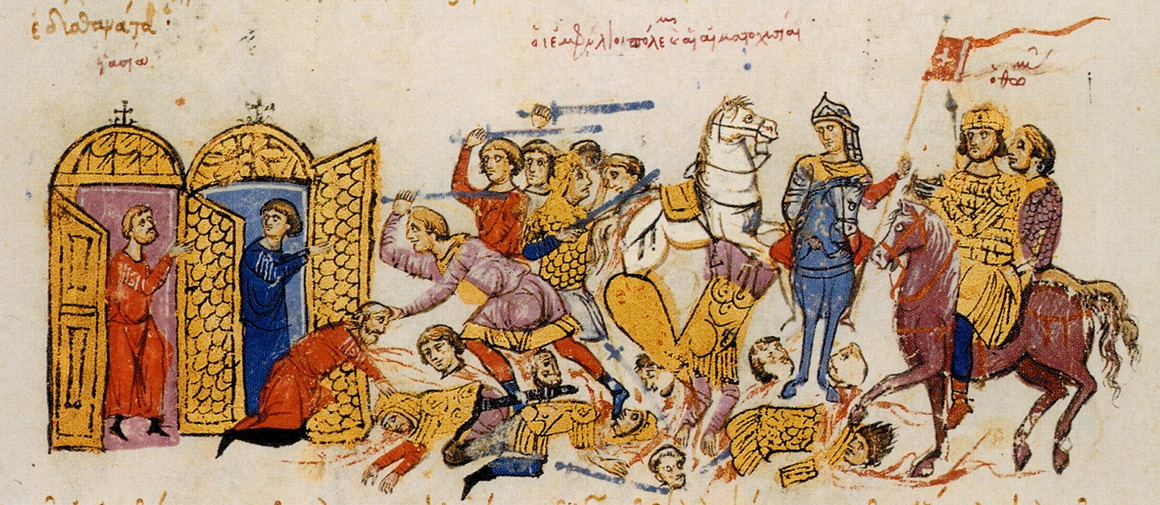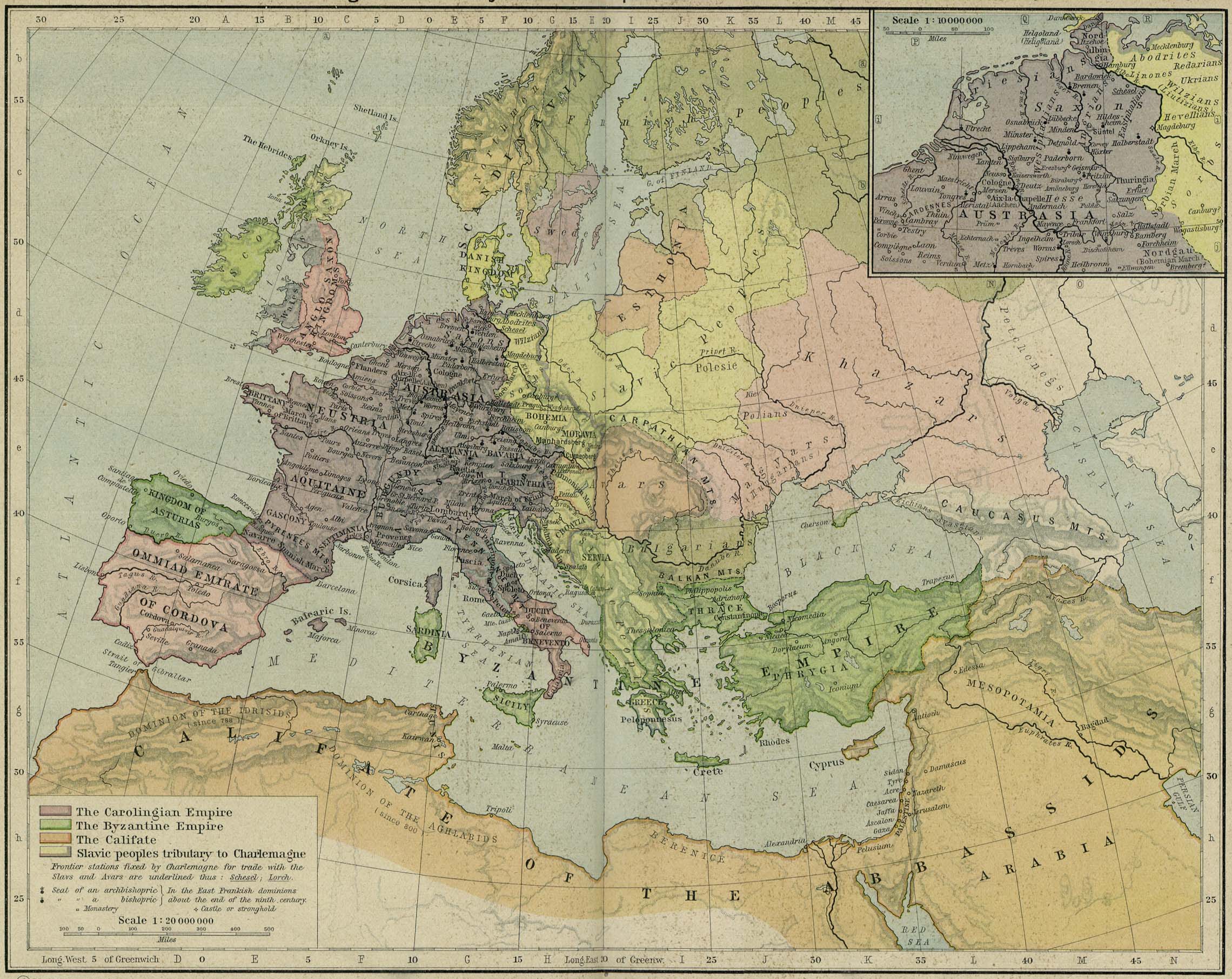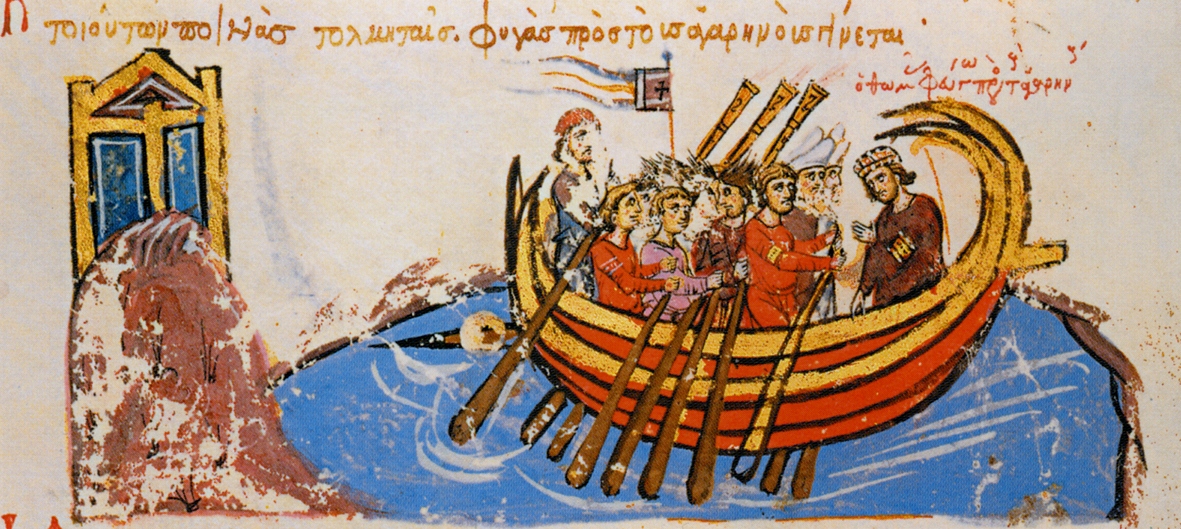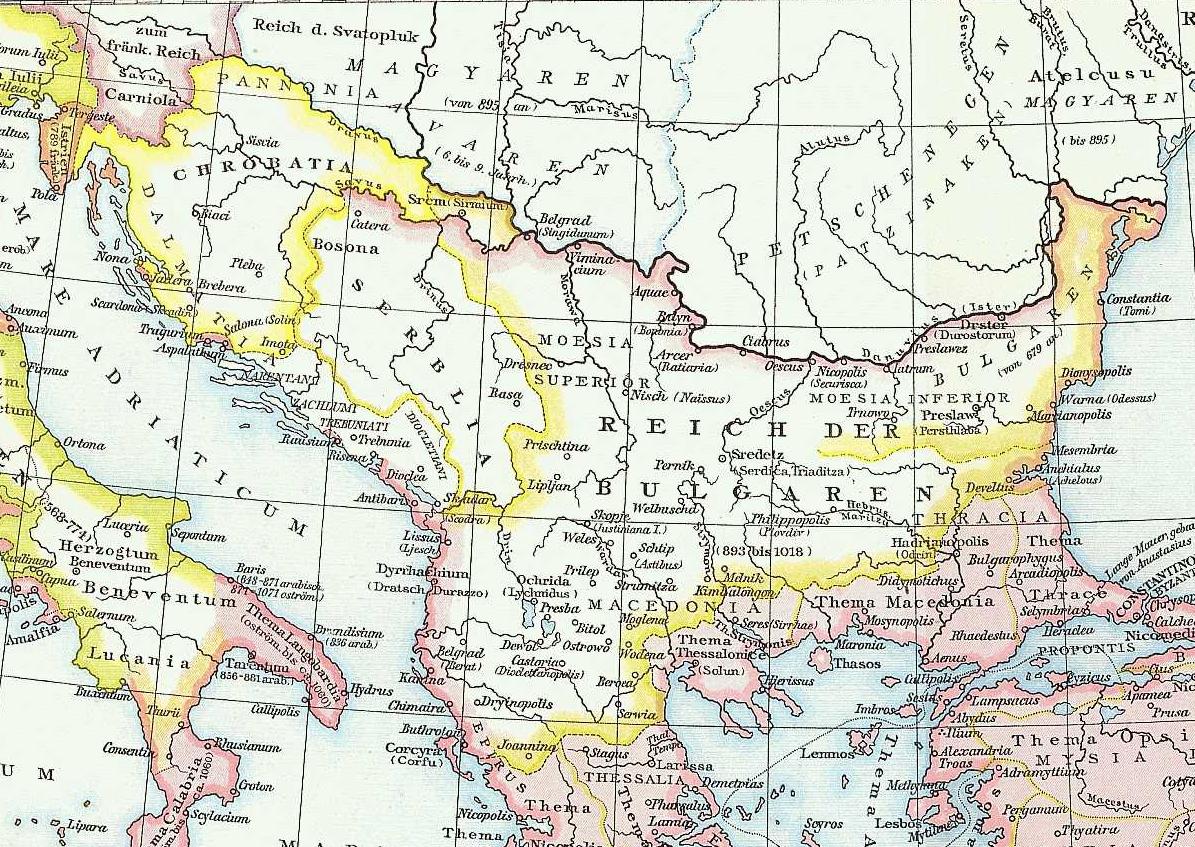|
821
__NOTOC__ Year 821 ( DCCCXXI) was a common year starting on Tuesday (link will display the full calendar) of the Julian calendar. Events By place Byzantine Empire * Byzantine general Thomas the Slav leads a revolt, and secures control over most of the Byzantine themes (provinces) in Anatolia. He gets recognition from the Abbasid Caliphate, and concludes a peace treaty with Caliph al-Ma'mun. Thomas crosses with his fleet from Abydos to Thrace, and blockades Emperor Michael II in Constantinople; but Thomas' first attack on the capital fails. Europe * February – Duke Borna of Croatia dies after an 11-year reign, as vassal of the Frankish Empire. He is succeeded by his nephew, Vladislav. Emperor Louis I recognizes him as prince of Dalmatia and Liburnia, at the Council of Aachen. * October – Lothair I, co-emperor and eldest son of Louis I, marries Ermengarde in Thionville (northeastern France). She is the daughter of Count Hugh of Tours. Britain * King C ... [...More Info...] [...Related Items...] OR: [Wikipedia] [Google] [Baidu] |
Coenwulf Of Mercia
Coenwulf (; also spelled Cenwulf, Kenulf, or Kenwulph; la, Coenulfus) was the King of Mercia from December 796 until his death in 821. He was a descendant of King Pybba, who ruled Mercia in the early 7th century. He succeeded Ecgfrith, the son of Offa; Ecgfrith only reigned for five months, and Coenwulf ascended the throne in the same year that Offa died. In the early years of Coenwulf's reign he had to deal with a revolt in Kent, which had been under Offa's control. Eadberht Præn returned from exile in Francia to claim the Kentish throne, and Coenwulf was forced to wait for papal support before he could intervene. When Pope Leo III agreed to anathematise Eadberht, Coenwulf invaded and retook the kingdom; Eadberht was taken prisoner, was blinded, and had his hands cut off. Coenwulf also appears to have lost control of the kingdom of East Anglia during the early part of his reign, as an independent coinage appears under King Eadwald. Coenwulf's coinage reappears in 805, indic ... [...More Info...] [...Related Items...] OR: [Wikipedia] [Google] [Baidu] |
Borna Of Croatia
Borna was the Duke of Croatia from to 821 and vassal of the Frankish Empire. He resided in Nin and was the ruler of most of the Croats in northern Dalmatia.John Van Antwerp Fine: The Early Medieval Balkans: A Critical Survey from the Sixth to the Late Twelfth Century, 1991, p. 255 Borna's predecessor was Višeslav of Croatia, probably his father. After his death in 821, he was succeeded by his nephew Vladislav. He is mentioned in the Royal Frankish Annals (''Annales regni Francorum'') in entries regarding 818–821. His titles were "Duke of the Guduscani" (a Croatian tribe from Lika and northern Dalmatia) in 818; "Duke of Dalmatia" in 819; "Duke of Dalmatia and Liburnia" in 821. Historiography treats him as a ruler of '' Dalmatian Croatia''. History Borna is documented in the "Royal Frankish Annals" (''Annales regni Francorum''). He is first mentioned regarding an 818 meeting at Herstal of Frankish Emperor Louis the Pious with envoys of the Obotrites, Borna (duke of the Gu ... [...More Info...] [...Related Items...] OR: [Wikipedia] [Google] [Baidu] |
Thomas The Slav
Thomas the Slav ( gr, Θωμᾶς ὁ Σλάβος, Thōmas ho Slavos, – October 823) was a 9th-century Byzantine Empire, Byzantine military commander, most notable for leading a wide-scale revolt in 821–23 against Byzantine emperor, Emperor Michael II the Amorian (). An army officer of Early Slavs, Slavic origin from the Pontus (region), Pontus region (now north-eastern Turkey), Thomas rose to prominence, along with the future emperors Michael II and Leo V the Armenian (), under the protection of general Bardanes Tourkos. After Bardanes' failed rebellion in 803, Thomas fell into obscurity until Leo V's rise to the throne, when Thomas was raised to a senior military command in central Asia Minor. After the murder of Leo and usurpation of the throne by Michael the Amorian, Thomas revolted, claiming the throne for himself. Thomas quickly secured support from most of the Theme (Byzantine district), themes (provinces) and troops in Asia Minor, defeated Michael's initial cou ... [...More Info...] [...Related Items...] OR: [Wikipedia] [Google] [Baidu] |
Vladislav Of Croatia
Vladislav or Ladislas ( la, Ladasclavus; 821) was the Duke of Croatia. In sources he is mentioned as the Duke of Dalmatia and Liburnia (''dux Dalmatiae atque Liburnae''), having succeeded his uncle Borna, a Frankish vassal. He is mentioned only in the 9th-century ''Royal Frankish Annals'', regarding year 821. Borna had died between January and October 821, during a war against Frankish rebel Ljudevit, Duke of Pannonian Croatia. Borna's nephew (by his sister) Vladislav succeeded him, by the people's will and emperor's approval. Vladislav ruled from Nin as a loyal vassal of the Frankish Emperor Lothair I. In historiography, his realm has been referred to as Dalmatian Croatia or Littoral Croatia, where he was succeeded by Duke Mislav Mislav ( la, Muisclavo) was a duke () in Croatia from around 835 until his death around 845. Mislav came to power at some point after Vladislav as the Duke of Dalmatian Croatia. He ruled from Klis in central Dalmatia, when he made Klis Fortress .... ... [...More Info...] [...Related Items...] OR: [Wikipedia] [Google] [Baidu] |
Ermengarde Of Tours
Ermengarde of Tours (- 20 Mar 851) was daughter of Hugh of Tours and Ava of Morvois. In October 821 in Thionville, Ermengarde married the Carolingian Emperor Lothair I of the Franks (795–855). Ermengarde used her bridal gift to found the abbey Erstein in the Elsass, in which she is buried. Ermengarde died in 851. Lothair and Ermengarde had: *Louis II of Italy * Helletrud (Hiltrud) (c. 826–after 865/866) m. Count Berengar (d. before 865/866) * Bertha (c. 830–after 7 May 852, probably 877), became before 847 Abbess of Avenay, perhaps Äbtissin of Faremoutiers * A daughter of unknown name (b. probably 826/830), called Ermengarde in later sources, kidnapped 846 by Gilbert, Count of the Maasgau, who then married her * Gisla (c. 830–860) 851–860 Abbess of San Salvatore in Brescia * Lothair II * Rotrud (baptized 835/840 in Pavia) m. around 850/851 Lambert, Margrave of Brittany, Count of Nantes (Widonen), who died 1 May 852 * Charles of Provence Charles of Pr ... [...More Info...] [...Related Items...] OR: [Wikipedia] [Google] [Baidu] |
Lothair I
Lothair I or Lothar I (Dutch and Medieval Latin: ''Lotharius''; German: ''Lothar''; French: ''Lothaire''; Italian: ''Lotario'') (795 – 29 September 855) was emperor (817–855, co-ruling with his father until 840), and the governor of Bavaria (815–817), King of Italy (818–855) and Middle Francia (840–855). Lothair was the eldest son of the Carolingian emperor Louis the Pious and his wife Ermengarde of Hesbaye, daughter of Ingerman the duke of Hesbaye. On several occasions, Lothair led his full-brothers Pepin I of Aquitaine and Louis the German in revolt against their father to protest against attempts to make their half-brother Charles the Bald a co-heir to the Frankish domains. Upon the father's death, Charles and Louis joined forces against Lothair in a three-year civil war (840–843). The struggles between the brothers led directly to the breakup of the Frankish Empire assembled by their grandfather Charlemagne, and laid the foundation for the development of moder ... [...More Info...] [...Related Items...] OR: [Wikipedia] [Google] [Baidu] |
France
France (), officially the French Republic ( ), is a country primarily located in Western Europe. It also comprises of Overseas France, overseas regions and territories in the Americas and the Atlantic Ocean, Atlantic, Pacific Ocean, Pacific and Indian Oceans. Its Metropolitan France, metropolitan area extends from the Rhine to the Atlantic Ocean and from the Mediterranean Sea to the English Channel and the North Sea; overseas territories include French Guiana in South America, Saint Pierre and Miquelon in the North Atlantic, the French West Indies, and many islands in Oceania and the Indian Ocean. Due to its several coastal territories, France has the largest exclusive economic zone in the world. France borders Belgium, Luxembourg, Germany, Switzerland, Monaco, Italy, Andorra, and Spain in continental Europe, as well as the Kingdom of the Netherlands, Netherlands, Suriname, and Brazil in the Americas via its overseas territories in French Guiana and Saint Martin (island), ... [...More Info...] [...Related Items...] OR: [Wikipedia] [Google] [Baidu] |
Michael II
Michael II ( gr, Μιχαὴλ, , translit=Michaēl; 770–829), called the Amorian ( gr, ὁ ἐξ Ἀμορίου, ho ex Amoríou) and the Stammerer (, ''ho Travlós'' or , ''ho Psellós''), reigned as Byzantine Emperor from 25 December 820 to his death on 2 October 829, the first ruler of the Amorian dynasty. Born in Amorium, Michael was a soldier, rising to high rank along with his colleague Leo V the Armenian ( 813–820). He helped Leo overthrow and take the place of Emperor Michael I Rangabe. However, after they fell out Leo sentenced Michael to death. Michael then masterminded a conspiracy which resulted in Leo's assassination at Christmas in 820. Immediately he faced the long revolt of Thomas the Slav, which almost cost him his throne and was not completely quelled until spring 824. The later years of his reign were marked by two major military disasters that had long-term effects: the beginning of the Muslim conquest of Sicily, and the loss of Crete to the Saracens. Do ... [...More Info...] [...Related Items...] OR: [Wikipedia] [Google] [Baidu] |
Thrace
Thrace (; el, Θράκη, Thráki; bg, Тракия, Trakiya; tr, Trakya) or Thrake is a geographical and historical region in Southeast Europe, now split among Bulgaria, Greece, and Turkey, which is bounded by the Balkan Mountains to the north, the Aegean Sea to the south, and the Black Sea to the east. It comprises southeastern Bulgaria (Northern Thrace), northeastern Greece (Western Thrace), and the European part of Turkey ( East Thrace). The region's boundaries are based on that of the Roman Province of Thrace; the lands inhabited by the ancient Thracians extended in the north to modern-day Northern Bulgaria and Romania and to the west into the region of Macedonia. Etymology The word ''Thrace'' was first used by the Greeks when referring to the Thracian tribes, from ancient Greek Thrake (Θρᾴκη), descending from ''Thrāix'' (Θρᾷξ). It referred originally to the Thracians, an ancient people inhabiting Southeast Europe. The name ''Europe'' first referred to ... [...More Info...] [...Related Items...] OR: [Wikipedia] [Google] [Baidu] |
Thionville
Thionville (; ; german: Diedenhofen ) is a city in the northeastern French department of Moselle. The city is located on the left bank of the river Moselle, opposite its suburb Yutz. History Thionville was settled as early as the time of the Merovingians. After the fall of the Western Roman Empire, the region was inhabited by the Germanic Alamanni. It was known in the Latin of that era as ''Theudonevilla'' or ''Totonisvilla''. King Pepin the Short had a royal palace constructed here. The Synod of Thionville was held here beginning on February 2, 835. It reinstated Emperor Louis the Pious and reversed his former conviction on crimes — none of which he actually committed — and deposed the Archbishop of Rheims, Ebbo. The Synod was composed of 43 bishops. On February 28, 835, in Mainz, Ebbo admitted that Louis had not committed the crimes of which he had been indicted and for which he had been deposed as Holy Roman Emperor. From the 10th century onward, the area ... [...More Info...] [...Related Items...] OR: [Wikipedia] [Google] [Baidu] |
Louis I The Pious
Louis the Pious (german: Ludwig der Fromme; french: Louis le Pieux; 16 April 778 – 20 June 840), also called the Fair, and the Debonaire, was King of the Franks and co-emperor with his father, Charlemagne, from 813. He was also King of Aquitaine from 781. As the only surviving son of Charlemagne and Hildegard, he became the sole ruler of the Franks after his father's death in 814, a position which he held until his death, save for the period 833–34, during which he was deposed. During his reign in Aquitaine, Louis was charged with the defence of the empire's southwestern frontier. He conquered Barcelona from the Emirate of Córdoba in 801 and asserted Frankish authority over Pamplona and the Basques south of the Pyrenees in 812. As emperor he included his adult sons, Lothair, Pepin and Louis, in the government and sought to establish a suitable division of the realm among them. The first decade of his reign was characterised by several tragedies and embarrassments, no ... [...More Info...] [...Related Items...] OR: [Wikipedia] [Google] [Baidu] |
Abbasid Caliphate
The Abbasid Caliphate ( or ; ar, الْخِلَافَةُ الْعَبَّاسِيَّة, ') was the third caliphate to succeed the Islamic prophet Muhammad. It was founded by a dynasty descended from Muhammad's uncle, Abbas ibn Abdul-Muttalib (566–653 CE), from whom the dynasty takes its name. They ruled as caliphs for most of the caliphate from their capital in Baghdad in modern-day Iraq, after having overthrown the Umayyad Caliphate in the Abbasid Revolution of 750 CE (132 AH). The Abbasid Caliphate first centered its government in Kufa, modern-day Iraq, but in 762 the caliph Al-Mansur founded the city of Baghdad, near the ancient Babylonian capital city of Babylon. Baghdad became the center of science, culture and invention in what became known as the Golden Age of Islam. This, in addition to housing several key academic institutions, including the House of Wisdom, as well as a multiethnic and multi-religious environment, garnered it a worldwide reputation as the ... [...More Info...] [...Related Items...] OR: [Wikipedia] [Google] [Baidu] |









.jpg)